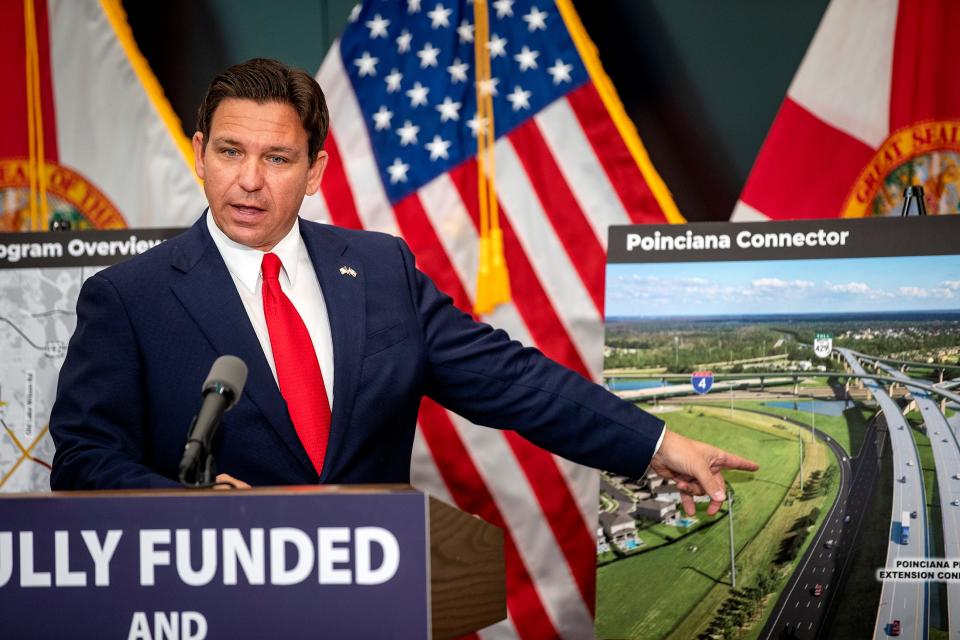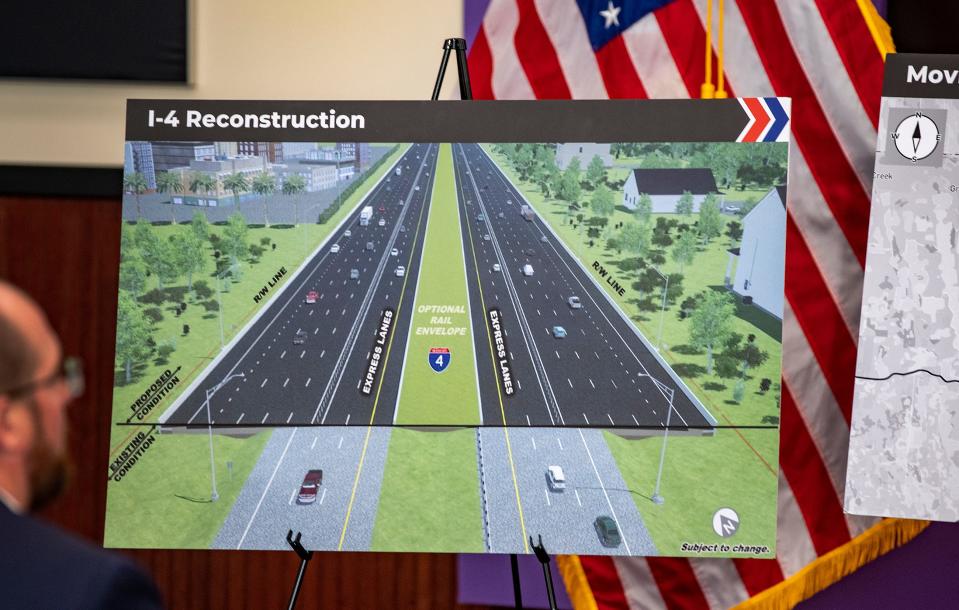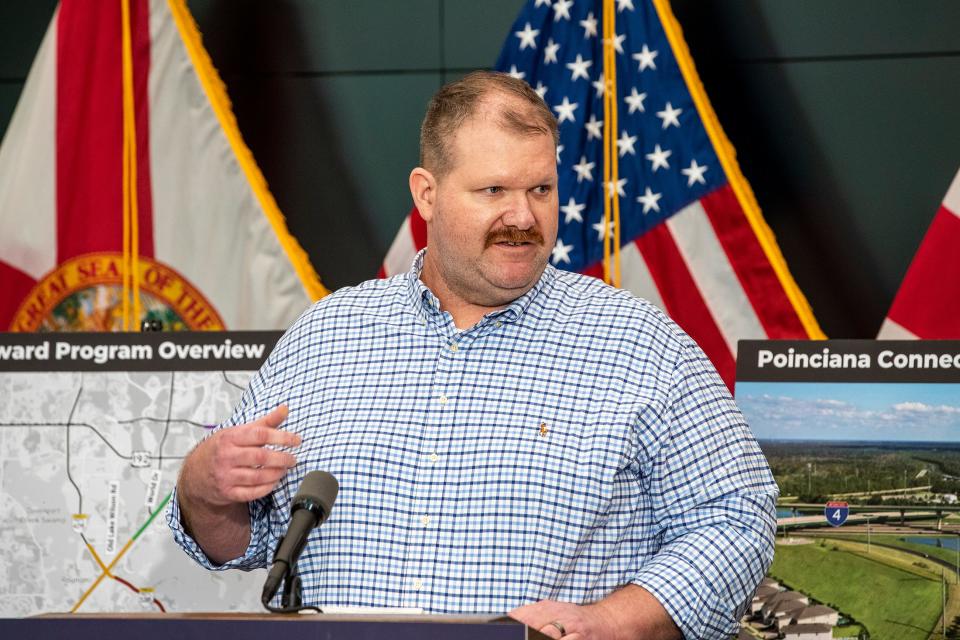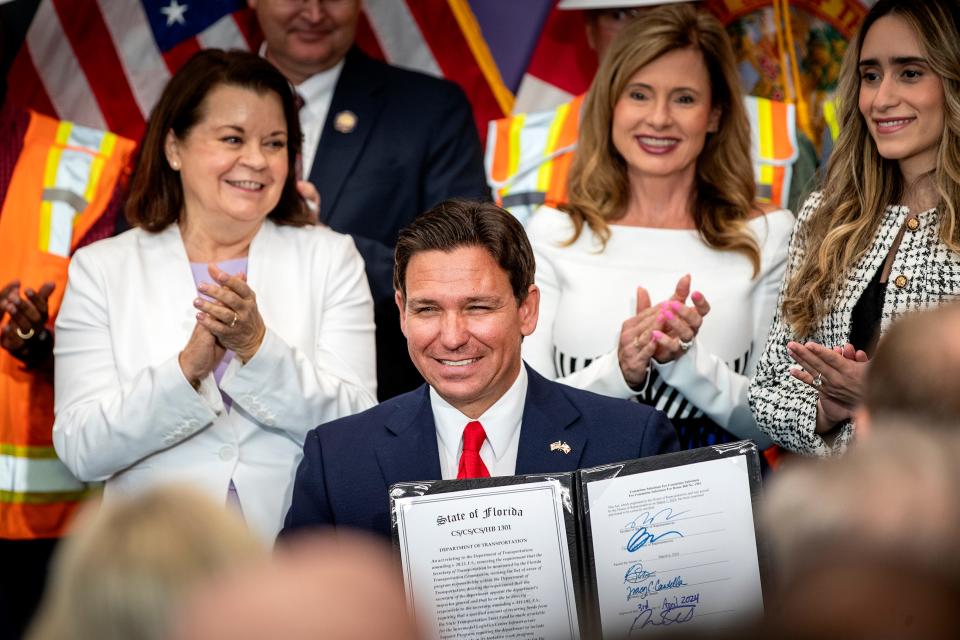Gov. Ron DeSantis touts highway projects in Polk County appearance
- Oops!Something went wrong.Please try again later.
LAKELAND — The electronic sign above Interstate 4 near Florida Polytechnic University announced Wednesday morning: “Stopped traffic ahead 14 miles.”
It was a familiar message for drivers on the clogged highway.
Florida Gov. Ron DeSantis later appeared at Florida Poly for a news conference, during which he assured local drivers that his administration is aware of the chronic congestion and is taking dramatic action to address it.
“Waiting in traffic isn’t good for people, particularly people that have families,” DeSantis said. “They want to get back (home) and do that. It takes away time, and it's harder to get to the office. You don’t know how much you're going to be there. … It’s not good for commerce to have these backstops.

“So this is a big investment — the total cost of all this is in the billions of dollars, when you look at what we're doing statewide to accelerate, but we're going to reap financial benefits on the back end of this.”
Standing at a lectern decorated with a purple sign reading, “Fully funded and ahead of schedule,” DeSantis offered further details on Moving Florida Forward, an initiative he first announced in Polk County in February 2023. The statewide program includes a project that will add lanes on I-4 between Lakeland and Orlando.
In all, DeSantis said, Florida has devoted about $2.5 billion to transportation projects around the state. He said that Moving Florida Forward is accelerating planned highway projects, in some cases by 10 or even 20 years.
The governor also signed a bill passed in this year’s legislative session, HB 1301, that focuses on transportation issues.
Addressing 'problem areas'
DeSantis was flanked Wednesday by displays for the I-4 reconstruction and the Poinciana Connector, a 2.6-mile project in Osceola County.
The widening of I-4 from six to 10 lanes from west of U.S. 27 into Osceola County will add two tolled express lanes in each direction for what FDOT has called congestion management. The project, covering 14.7 miles, will also widen road shoulders and rework interchanges to reduce backups and queuing, DeSantis' office said.

The design also calls for adding a corridor for a potential rail line in the median.
FDOT plans to advertise for the Polk County segment in fiscal year 2025. Planning and design for the $600 million project will begin next year, though drivers likely will not notice construction work until 2027, the agency has said. FDOT has set a 54-month timeline for completion of the project.
Though DeSantis travels the state mostly by private jet, he displayed an awareness of the traffic miseries that other Floridians regularly encounter. He describes sections of I-4 in Polk and around ChampionsGate, at the Polk-Osceola County border, as “problem areas.”
Florida’s dizzying population growth compounds the problem of crowded roadways. DeSantis cited a recent U.S. Census report that found four of the nation’s five fastest-growing metropolitan areas are in Florida, with the Lakeland-Winter Haven area ranked second.
South Florida Avenue FDOT tells Lakeland that funding to move the Dixieland road diet forward is a city problem
“I don’t go out there begging people to come,” DeSantis said. “I think it's just that people vote with their feet. So we just have to recognize that reality and look and say, ‘OK, you have a state that's growing, particularly in this region of the state.’ And we want to make sure we get ahead of that. We already had traffic congestion that is really, really bad in many parts of the state.”
Will the projects bring an end to routine stoppages and slow-rolling on I-4, or will they merely maintain the traffic quo amid continuing population growth? DeSantis said the goal is both to “mitigate” existing problems and bring improvements.
“So I do think, when all this is done, I think it will be better than it is now, for sure,” DeSantis said. “But I also think that there's going to be more, probably more people on the roads in three years, in five years, than there are now. That's just the nature of it.”
DeSantis invited Jeremy Barnes, operations manager at Sabal Transport in Bartow, to speak. Barnes said that Lori Albritton, a director with FDOT’s District 1 office in Bartow, called him a few days earlier and asked if he could provide “a trucker’s perspective.”

Barnes said Sabal Transport has been in business for more than 40 years.
“Particularly over the last five years, we have seen I-4 transit times dramatically increase, causing substantial loss in trucks’ productivity and efficiency,” Barnes said. “Equally important in our industry is added driver fatigue and frustration that could create safety issues in constant congestion.”
Barnes said the delays result in increased rates for shippers, which are often passed along to consumers who buy the goods being carried on his company’s trucks.
“We at Sabal and especially speaking for our fantastic drivers, are thrilled to learn about this project and (the goal) to get I-4 flowing again, as it was intended,” Barnes said.
FDOT chief: 'Truly historic'
Florida Transportation Secretary Jared Perdue, described the Moving Florida Forward initiative as “truly historic,” saying it seeks to “solve I-4 traffic congestion and many other issues throughout the state.”
Perdue praised the Florida Legislature, which he said has designated $2.5 billion into projects on the I-4 corridor. He said that FDOT, which compromises seven district offices, has created a separate team to oversee the Moving Florida Forward projects in Central Florida.
“And now FDOT will answer the call and begin construction on all 20 (state) projects within the next four years,” Perdue said. “This is how government is supposed to work: everyone working towards a common goal, putting people first. Transportation has a huge impact on quality of life for all of our communities.”
Nicola Liquori, executive director of the Florida Turnpike Enterprise, also spoke at the event.
DeSantis signed H.B. 1301 while seated at a table and backed by elected officials and other guests. Among other things, the 39-page bill gives the governor full control over appointing the Secretary of Transportation and requires that local governments conduct traffic studies on adverse impacts before repurposing existing traffic lanes.
The bill also devotes $15 million from the State Transportation Trust Fund — beginning in the 2024-25 fiscal year — for the Intermodal Logistics Center Infrastructure Support Program. One such center in Winter Haven is a hub for transferring loads from railroad cars to trucks.

DeSantis also promoted the return of a program that offers 50% discounts on tolls for frequent drivers on toll roads.
As always with DeSantis’ news conferences, the gathering at times had the feel of a campaign rally. The audience of nearly 100 included invited local Republicans and elected officials, who filled rows of seats in front of media members. The audience applauded often throughout DeSantis’ remarks.
Elected officials in the audience included Florida Sen. Colleen Burton, R-Lakeland; Florida Rep. Melony Bell, R-Fort Meade; Florida Rep. Carolina Amesty, R-Windermere; Lakeland Mayor Bill Mutz and City Commissioners Stephanie Madden, Mike Musick and Guy LaLonde; Polk County Commissioners Bill Braswell and Neil Combee; Auburndale Mayor Dorothea Taylor Bogert; Bartow Vice Mayor Trish Pfeiffer.
A group of Florida DOT employees also stood by, wearing orange reflective vests and hard hats.
Though the governor ended his presidential campaign in January, he offered several jabs at the Biden administration, which he and Perdue accused of pursuing ideologically motivated transportation policies.
Before the event began, a staffer for DeSantis announced that the governor was running late. That provoked audience quips that he must have been stuck in I-4 traffic.
Gary White can be reached at gary.white@theledger.com or 863-802-7518. Follow on X @garywhite13.
This article originally appeared on The Ledger: In Polk County, DeSantis says project will relieve congestion on I-4

